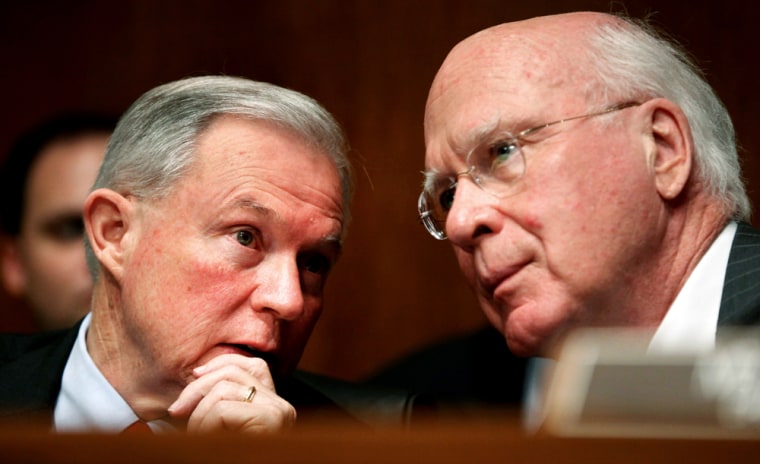The Senate is known for its fixed tradition, established procedure and time-honored collegiality — but a case of telephone tag almost unhinged it all in the Senate Judiciary Committee.
So committee Chairman Patrick J. Leahy went face to face to apologize to Jeff Sessions for not speaking directly with the panel’s ranking Republican before announcing the start date for Sonia Sotomayor’s Supreme Court confirmation hearing.
“I apologize in not being more diligent in trying to reach you,” Leahy, D-Vt., told Sessions, R-Ala., at the committee’s weekly markup.
Sessions had been attending a military funeral at Arlington National Cemetery on June 9 when Leahy announced the July 13 hearing date on the Senate floor. Sessions said then that Leahy had left a message at his office, but when Sessions called back, he missed Leahy.
Sessions has repeatedly expressed disappointment at learning about the schedule from media reports rather than from Leahy. In hindsight, Leahy said, he should have held off until after speaking with Sessions.
However, Leahy appeared unmoved by Sessions’ request that he “slow down a bit” with the committee’s other legislative business so the staff could focus on vetting the high court nomination. And it remains unclear whether the apology, which Leahy first extended to Sessions in private, will help repair relations with the committee’s new ranking member. Sessions warned Thursday the handling of the Sotomayor nomination was “causing collegiality to be eroded.”
“I’m hopeful that we’ll yet end up with a good solution,” said Sessions.
In the clubby world of the Senate, where any one member has the power to hamstring the entire body, much depends on small but elaborate courtesies and a sense of collegiality that transcends political party. Leahy, buoyed by the Democrats’ control of the White House and enlarged Senate majority, has shown little appetite for accommodating Republicans, particularly when it comes to judicial nominations.
However, Leahy has made some goodwill gestures since Sessions took over as the top committee Republican in April following Pennsylvania Sen. Arlen Specter ’s defection to the Democratic Party. He announced at a committee markup last month that an additional amount of money the Senate allocated to the committee to prepare for the Supreme Court vacancy would be evenly divided between the Democratic and Republican staffs. In the days after President Obama announced his choice of Sotomayor on May 26, Leahy initially held off on announcing a date for her confirmation hearing, saying he wanted to consult with Sessions first.
On Thursday, he also gave Republicans all the time they wanted to discuss Obama’s nomination of Gerard E. Lynch, to the U.S. Court of Appeals for the 2nd Circuit, who was approved by voice vote. Leahy had earlier angered committee Republicans by scheduling a confirmation hearing for another appellate court nominee, David F. Hamilton, just two weeks after President Obama sent his name to the Senate.
“Sen. Leahy can be very gracious when he puts his mind to it,” Sessions said.
Leahy and Sessions talked about the timing of the Sotomayor hearing last week. But those discussions left the two men with different impressions about what might happen next. Sessions said he expected the conversations to continue this week. Leahy viewed a letter from Minority Leader Mitch McConnell, R-Ky., to Majority Leader Harry Reid , D-Nev., about the confirmation as sufficient evidence Republican leaders had been informed.
“That was not the way to do it,” said Orrin G. Hatch , R-Utah, who as chairman of the committee sparred with Leahy when the latter was the ranking Democrat. “It’s not the way to treat a ranking member.”
While committee Republicans said they hadn’t decided whether they might respond by holding up other committee business, there was at least one sign of retaliation Wednesday.
Reid said Republicans had held up the nomination of William Sessions III of Vermont to head the U.S. Sentencing Commission. Republicans are very unlikely to attempt a filibuster, but they have several procedural tools they can employ to slow the nomination in committee or on the Senate floor.
Keith Perine contributed to this story.
